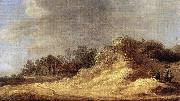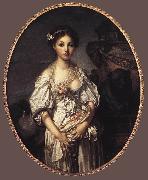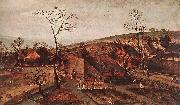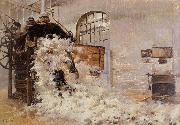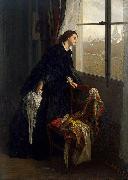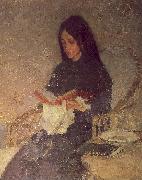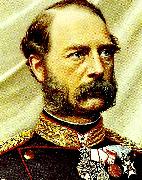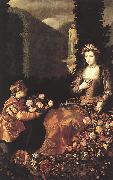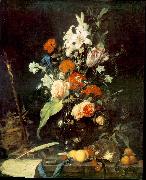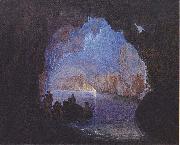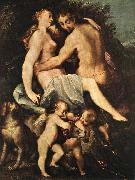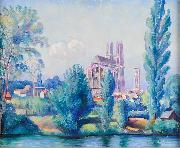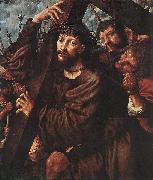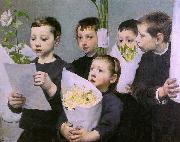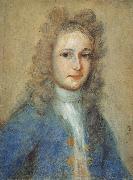|
|
|
|
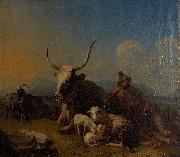 |
Eugne Joseph Verboeckhoven
|
|
(1790-1881), Belgian painter, was born at Warneton in West Flanders, and received instruction in drawing and modelling from his father, the sculptor Barthelemy Verboeckhoven. Subsequently he settled in Brussels and devoted himself almost exclusively to animal subjects.
Shepherd with animals in the countryside
attributed to Eugene Verboeckhoven - private collectionHis paintings of sheep, of horses and of cattle in landscape, somewhat after the manner of Paulus Potter, brought him universal fame, and were eagerly sought for by collectors. Precise and careful finish is the chief quality of his art, which is entirely objective and lacking in inspiration. Verboeckhoven visited England in 1826, Germany in 1828, and France and Italy in 1841, and died at Brussels in 1881. He was a member of the academies of Brussels, Ghent, Antwerp, St. Petersburg and Amsterdam. Examples of his art are to be found in nearly all the important galleries of Europe and the United States, notably in Brussels, Antwerp, Amsterdam, Hamburg, Berlin, Munich, New York, Boston and Washington D.C.. His long life and ceaseless industry account for the enormous number of his pictures in public and private collections and in the art market. In addition to his painted work he executed some fifty etched plates of similar subjects.
|
|
|
|
|
|
|
|
|
|
|
|
|
|
|
|
|
|
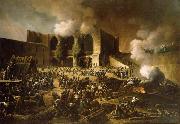 |
Francois Joseph Heim
|
|
(16 December 1787 - 29 September 1865) was a French painter.
He was born at Belfort. He early distinguished himself at the École Centrale of Strassburg, and in 1803 entered the studio of Vincent at Paris. In 1807 he obtained the first prize, and in 1812 his picture of "The Return of Jacob" (Musee de Bordeaux) won for him a gold medal of the first class, which he again obtained in 1817, when he exhibited, together with other works, a St John--bought by Vivant Denon.
In 1819 the "Resurrection of Lazarus" (Cathedral Autun), the "Martyrdom of St Cyr" (St Gervais), and two scenes from the life of Vespasian (ordered by the king) attracted attention. In 1823 the "Re-erection of the Royal Tombs at St Denis," the "Martyrdom of St Laurence" (Nôtre Dame) and several full-length portraits increased the painter's popularity; and in 1824, when he exhibited his great canvas, the "Massacre of the Jews" (Louvre), Heim was rewarded with the Legion of Honour.
In 1827 appeared the "King giving away Prizes at the Salon of 1824" (Louvre--engraved by Jazet) the picture by which Heim is best known and "Saint Hyacinthe." Heim was now commissioned to decorate the Gallery Charles X (Louvre). Though ridiculed by the romantists, Heim succeeded Regnault at the Institute in 1834, shortly after which he commenced a series of drawings of the celebrities of his day, which are of much interest.
His decorations of the Conference room of the Chamber of Deputies were completed in 1844; and in 1847 his works at the Salon "Champ de Mai" and "Reading a Play at the Theâtre Français" were the signal for violent criticisms. Yet something like a turn of opinion in his favour took place at the exhibition of 1851; his powers as draughtsman and the occasional merits of his composition were recognized, and toleration extended even to his colour.
Heim was awarded the great gold medal, and in 1855--having sent to the Salon no less than sixteen portraits, amongst which may be cited those of Cuvier, Geoffroy de St Hilaire, and Madame Hersent he was made officer of the legion of honour. In 1859 he again exhibited a curious collection of portraits, sixty-four members of the Institute arranged in groups of four.
Besides the paintings already mentioned, there is to be seen in Nôtre Dame de Lorette (Paris) a work executed on the spot; and the museum of Strassburg contains an excellent example of his easel pictures, the subject of which is a Shepherd Drinking from a Spring.
cjr |
|
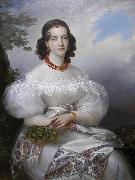 |
Francois Joseph Kinson
|
|
François-Joseph Kinson (1771-1839) was a Flemish painter.
Kinson attended art school at Bruges and soon established a reputation in Ghent and Brussels. He exhibited a portrait in Paris in 1799. Settling in Paris after the exhibition, the artist courted the favor of the rich and famous of the time. Kinson worked for Napoleones court and eventually became court painter to Jerôme Bonaparte, King of Westphalia. Kinson is best remembered for his portraits of elegant women. The artist worked as a court painter in Paris until 1830, and died in 1839 at the age of 68.
|
|
|
|
|
|
|
|
|
|
|
|
|
|
|
|
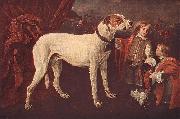 |
FYT, Jan
|
|
Flemish Baroque Era Painter, 1611-1661
|
|
|
|
|
|
|
|
|
|
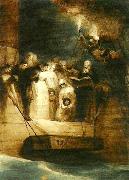 |
george jones
|
|
George Glenn Jones (born September 12, 1931) is an American country music singer known for his long list of hit records, his distinctive voice and phrasing, and his marriage to Tammy Wynette.
Over the past 20 years, Jones has frequently been referred to as "the greatest living country singer." Country music scholar Bill C. Malone writes, "For the two or three minutes consumed by a song, Jones immerses himself so completely in its lyrics, and in the mood it conveys, that the listener can scarcely avoid becoming similarly involved."
Throughout his long career, Jones made headlines often as much for tales of his drinking, stormy relationships with women, and violent rages as for his prolific career of making records and touring. His wild lifestyle led to Jones missing many performances, earning him the nickname "No Show Jones." With the help of his fourth wife, Nancy, he has been sober for many years. Jones has had more than 150 hits during his career, both as a solo artist and in duets with other artists. The shape of his nose and facial features have given Jones the nickname "The Possum." Jones said in an interview that he has chosen to tour only about 60 dates a year. |
|
|
|
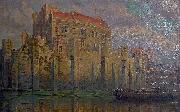 |
Georges Jansoone
|
|
George Jamesone (or Jameson) (c. 1587-1644) was Scotland's first eminent portrait-painter.
He was born in Aberdeen, where his father, Andrew Jamesone, was a stonemason. Jamesone attended the grammar school near his home on Schoolhill and is thought to have gone on to further education at Marischal College. Legend has it that Jamesone once studied under Rubens in Antwerp with Anthony van Dyck. However, this is yet to be proven as his name does not appear to be noted in the Guild registers of the town. However, considering that Rubens was exempt from registering pupils; this does not mean that the painter definitely did not study there. Jamesone certainly did complete an apprenticeship under the supervision of his uncle, John Anderson, who was a popular decorative painter in Edinburgh at the beginning of the seventeenth century. Jamesone finished this training in 1618. He is not recorded as being in Aberdeen again until 1620. If the Scotsman had gone to Antwerp, it would have had to have been between the years of 1618 to 1620. |
|
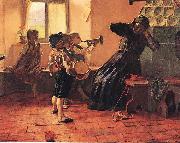 |
Georgios Jakobides
|
|
Lesbos 11 January 1853 - Athens 13 December 1932) was a Greek painter and one of the main representatives of the Greek artistic movement of the Munich School. He founded and was the first curator of the National Gallery of Greece in Athens.
His first education was in Izmir, Turkey. From 1870 to 1876 Jakobides studied sculpture and painting at the Athens School of Fine Arts, and in 1877 he went to the Akademie der Bildenden Kenste in Munich on a scholarship to continue his painting studies under Karl Theodor von Piloty. In Munich he lived for 17 years where he worked in his studio, painting mythological scenes, genre pictures, and portraits. His work is influenced by German academic Realism, his most famous paintings were of children. In the capital of Bavaria he was regarded as a successful German artist selling many of his works at high prices. The Greek government invited him in 1900 to return to Athens to organize the National Gallery of Athens, and in 1904 he was appointed Director of the Athens School of Fine Arts where he taught for 25 years. At this time, additional to his themes he produced formal portraits of eminent Greeks (e.g.Queen Sophia). He opposed all new artistic tendencies, including Impressionism and Expressionism, but supported younger artists to follow their own individual artistic tendencies.
He was given awards at five international exhibhits: among those in Berlin 1891 and in Paris 1900. |
|
|
|
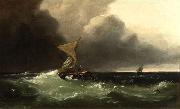 |
Gideon Jacques Denny
|
|
(1830-1886) was a marine artist who was born in Wilmington, Delaware on July 15, 1830. As a young man, he worked on ships in the Chesapeake Bay. He traveled to California in 1849 with the Gold Rush. He worked as a teamster on the San Francisco docks and was a member of the San Francisco Committee of Vigilance. After two years in California, he moved to Milwaukee, where he studied painting with Samuel Marsden Brookes. After six years of study in Milwaukee, Denny returned to San Francisco and established a studio on Bush Street. In 1862, Brooks moved to San Francisco and shared a studio with Denny. In 1868, Denny spent two months in Hawaii visiting several islands. He is also known to have visited Canada and South America. Denny died of malaria in Cambria, California on Oct. 7, 1886.
The Berkeley Art Museum and Pacific Film Archive, the Bishop Museum (Honolulu), the Crocker Art Museum (Sacramento, California), the Fine Arts Museums of San Francisco, Monterey Peninsula Museum of Art, and the Oakland Museum of California are among the public collections holding works by Gideon Jacques Denny.
|
|
|
|
|
|
|
|
|
|
|
|
|
|
|
|
|
|
|
|
|
|
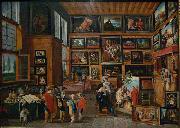 |
Hans Jordaens
|
|
(1555 - 1630), was a Flemish Baroque painter whose religious works are often confused with that of other painters with the same name.
|
|
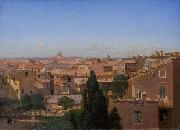 |
Hans Jorgen Hammer
|
|
(29 December 1815, Copenhagen - 28 Januar 1882, Rome) was a Danish artist who specialized in genre painting.
Following an apprenticeship with J.G. Berg in Copenhagen, Hammer was admitted to the Danish Academy in 1828. In 1841, he became a student of Christoffer Wilhelm Eckersberg who remained a close friend. He was awarded the Academy's little silver medal in 1842 and the large silver medal the following year. Det sidste Læs, his entry for the Neuhausen Prize in 1845, was bought by Statens Museum for Kunst but it was not until 1837 that he was awarded the prize with Bønder forsamlede til Lystighed en Søndag Eftermiddag under aaben Himmel.
Hammer was an industrious but rather serious and thoughtful artist. His avid approach to detail slowed down his work considerably. After the outbreak of war in 1848, he became a naval officer. With a stipendium from the Academy, he travelled to Italy in 1857 where he painted Torvet i Ariccia efter Solnedgang, considerably enhancing his reputation in Denmark. The painting was acquired by Statens Museum for Kunst in 1863. Other notable works are Axsamlersken (1866) and Postbudet med det længe ventede Brev (1877). After recovering from a serious illness, he travelled to Rome in 1881 but died there the following year
|
|
|
|
|
|
|
|
|
|
|
|
|
|
|
|
|
|
|











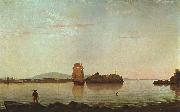
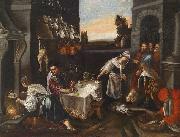
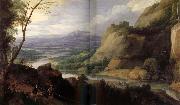
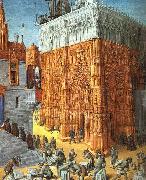
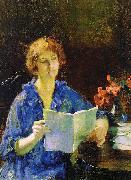
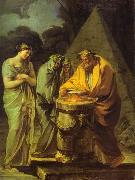


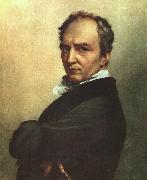
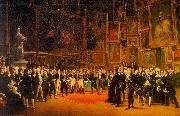
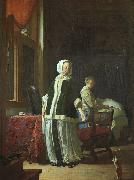
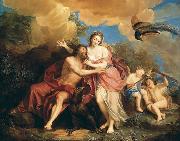
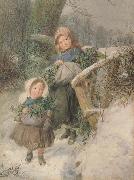
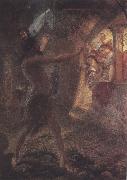
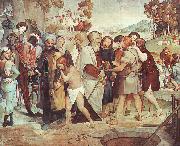

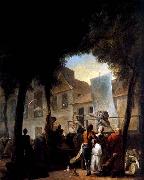

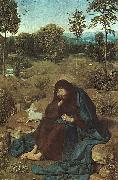
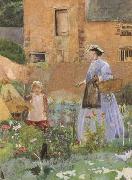

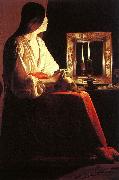


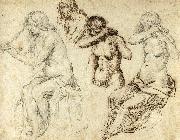

1.jpg)
